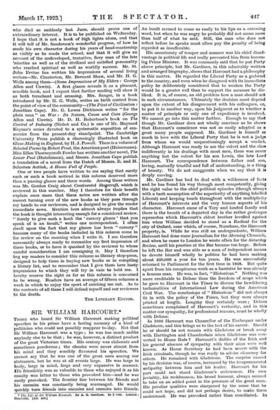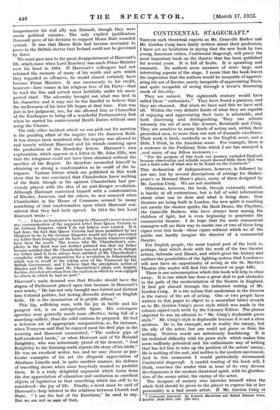SIR WILLIAM HARCOTTRT.*
Tnosz who heard Sir William Harcourt making political. speeches in his prime have a lasting memory of a kind of politician who could not possibly reappear to-day. Not that Sir William Harcourt was a type ; he was too much unlike anybody else to be that ; he was, however, a distinct product of the great Victorian times. His oratory was elaborate and sometimes ponderous ; the classics were never absent from his mind and they sensibly flavoured his speeches.. We cannot say that he was one of the great ones among our statesmen, but he was at all events large. He was large in body, large in mind, large and very expansive in manner. Kin friendship was as valuable to those who enjoyed it as his enmity was bitter to those who provoked him—and he was easily provoked. The frontier line between his friends and his enemies was constantly being rearranged. He would quickly turn friends into enemies and enemies into friends.
• The Lip of Sir William Harcourt. By A. O. Gardiner. In 2 vols. London : Constable, P45s. net.]
An insult seemed to come as easily to his lips as a caressing word, but when he was angry he probably did not mean more than half of what he said. Still, the man who does not reflect before he speaks must often pay the penalty of being regarded as insufferable.
His uncertainty of temper and manner was his chief disad- vantage in political life and really prevented him from becom- ing Prime Minister. It was commonly said that he put Party above principle, but Mr. Gardiner, in this admirably written and arranged biography, shows that Harcourt had a philosophy in this matter. He regarded the Liberal Party as a godsend to the country, and even when he disagreed with its immediate policy he deliberately considered that to weaken the Party would be a greater evil than to support the measure he dis- liked. It is, of course, an old problem how a man should act in such circumstances. Ultimately the decision must depend upon the extent of his disagreement with his colleagues, or, to put it in another way, upon his judgment as to whether a matter of principle or only one of expediency is involved. We cannot go into this matter further. Enough to say that though Mr. Gardiner does not wholly convince us he shows that Harcourt's conscience was not so easily adapted as a great many people supposed. Mr. Gardiner is himself so much in love with the Liberal Party that he is not a judge from whom we would unquestioningly accept a verdict. Although Harcourt was ready to use the velvet and the claw indifferently in his dealings with most men, there was never anything but the velvet for his son Lewis, the late Lord Harcourt. The correspondence between father and son, loving, mutually trustful and full of understanding, is a thing of beauty. We do not exaggerate when we say that it is deeply moving.
Mr. Gardiner has had to deal with a wilderness of facts and he has found his way through most competently, giving the right value to the chief political episodes (though always with a tacit assumption of the superiority of anything labelled Liberal) and keeping touch throughout with the multiplicity of Harcourt's interests and the very human aspects of his character. Harcourt came of a Tory and landed family and there is the breath of a departed day in the rather grotesque reproaches which Harcourt's eldest brother levelled against him when William decided to stand as a Radical for the city of Oxford, near which, of course, Nuneham, the Harcourt property, is. While he was still an undergraduate, William Harcourt had done some journalism for the Morning Chronicle, and when he came to London he wrote often for the. Saturday Review, until his practice at the Bar became too large. Before he left the Bar and was able as a man of independent means to devote himself wholly to politics he had been making about Z20,000 a year for ten years. He was successfully returned to Parliament for the first time in 1868. But quite apart from his conspicuous work as a barrister he was already a famous. man. He was, in fact, "Historicus." Nothing was more creditable to Delane than the freedom of scope which he gave to Harcourt in the Times to discuss the bewildering technicalities of International Law during the American Civil War. The conclusior of " Historicus " did not always fit in with the policy of the Times, but they were always printed at length. Lengthy they certainly were ; Delano sometimes complained of Harcourt's verbosity, and in this matter our sympathy, for professional reasons, must be wholly with Delane.
In 1886 Harcourt was Chancellor of the Exchequer under Gladstone, and this brings us to the test of his career. Should he or should he not remain with Gladstone or break away with Hartington and Chamberlain when Gladstone was con- verted to Home Rule ? Harcourt's dislike of the Irish and his general absence of sympathy with their aims were well known. As Home Secretary he had been severe with the Irish criminals, though he was ready to advise clemency for others. He remained with Gladstone. The surprise caused by his decision was, of course, increased by the temperamental antipathy between him and his leader. Harcourt for his part could not stand Gladstone's seriousness. His own joviality, his recklessness, his broad humour, always seemed to take on an added point in the presence of the great man. His peculiar qualities were sharpened by the sense that he could not hope, and did not perhaps desire, to make them understood. He was provoked rather than conciliated. In
temperament his real ally was Disraeli, though, they were sworn political enemies. The only explicit justification Harcourt gave of his decision to support Home Rule sounded cynical. It was that Home Rule had become necessary to prove to the British elector that Ireland could not be governed by force. We must pass now to the great disappointment of Harcourt's
life, which came when Lord Rosebery was made Prime Minister over his head in 1894. If Harcourt's colleagues had not retained the memory of many of his words and acts which they regarded as offensive, he would almost certainly have become Prime Minister. It was enormously to his credit, however—here comes in his religious love of his Party—that he toed the line and served most faithfully under his unex- pected chief. The adversity brought out what was best in his character, and it may not be too fanciful to believe that the mellowness of his later life began at that time. Fate was
just in her judgment, too, for she allowed him as Chancellor of the Exchequer to bring off a wonderful Parliamentary feat when he carried his controversial Death Duties without once using the Closure.
The only other incident which we can pick out for mention is the puzzling affair of the inquiry into the Jameson Raid. It has always been wondered why the inquiry was allowed to end tamely without Harcourt and his friends insisting upon the production of the Hawksley letters. Harcourt's own explanation, which appears in a letter to Mr. John Ellis, was that the telegrams could not have been obtained without the sacrifice of the Report. He therefore reconciled himself to obtaining as strong a condemnation as he could of the in- triguers. Various letters which are published in this work show that he was convinced that Chamberlain knew nothing of the Raid, though in his opinion Chamberlain had pre- viously played with the idea of an anti-Kruger revolution.
Although Harcourt contented himself with a condemnation of Rhodes, Jameson, and the others, he was annoyed when Chamberlain in the House of Commons seemed to unsay something of that condemnation upon which Harcourt con- sidered that they had both agreed. In 1914 the late Lord Harcourt wrote :—
" . . . I have no hesitation in saying he (Harcourt) never received any communication of the supposed letter from Queen Victoria to the German Emperor, which I do not believe ever existed. If it had done, the. fact ,tbat Queen Victoria had been permitted by her Ministers to lie to the German Emperor would not have prevented my father from bringing out the facts at the Inquiry whatever might have been the result. The reason why Mr. Chamberlain's com- plicity in the Raid was not further pursued was that my father became satisfied that Mr. Chamberlain was not a party to it, though my father (and I) have always been satisfied of Mr. Chamberlain's complicity with the preparations for a revolution in Johannesburg which was to result in the taking over of the Transvaal by the British Government, and I believe that the precipitate action of Rhodes and Dr. Jim upset Mr. Chamberlain's plans, and, happily for him, diverted attention from the matters in which he was engaged to others in which he had no part."
Harcourt's main demand was that Rhodes should have the stigma of Parliament placed upon him because, in Harcourt's own words, " He has not only brought race hatred and distrust into Colonial politics, but lasting discredit abroad on English faith. He is the incarnation of la perfide Albion."
This big, rollicking man, with his joy in battle and his pungent wit., is an unforgettable figure. His extempore speeches were generally much more effective, being full of a searching raillery, than the solid orations he prepared. He had a delicious art of appropriate misquotation, as, for instance, when Tennyson said that he enjoyed most his first pipe in the morning and Harcourt commented, " The earliest pipe of half-awakened bards," or when Harcourt said of Sir Rainald Knightley, wbo was notoriously proud of his descent, " And Knightley to the listening earth repeats the story of his birth." He was an excellent writer, too, and we may choose as par- ticular examples of his art the eloquent appreciation of Abraham Lincoln and, in quite another manner, his defence of travelling shows when some busybody wanted to prohibit them. It is a truly delightful argument which turns from the due appreciation of education and sanitation as excellent objects_ of legislation to that something which has still to be considered—the joy of life. Finally, a word must be said of Harcourt's deep interest in the relations between Church and State. " I am the last of the Erastiahs," he used to say. But we are not so sure of that.











































 Previous page
Previous page